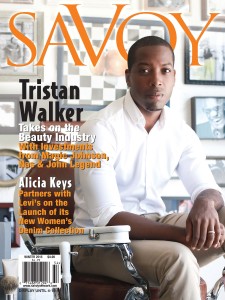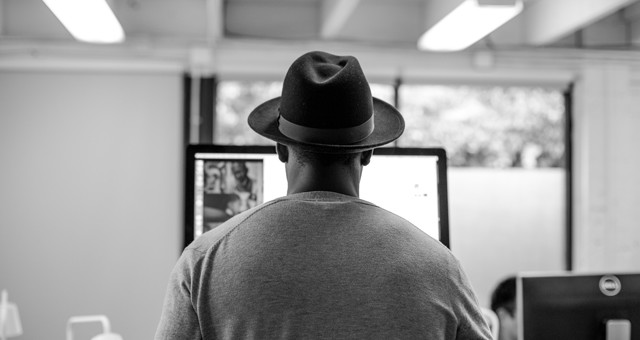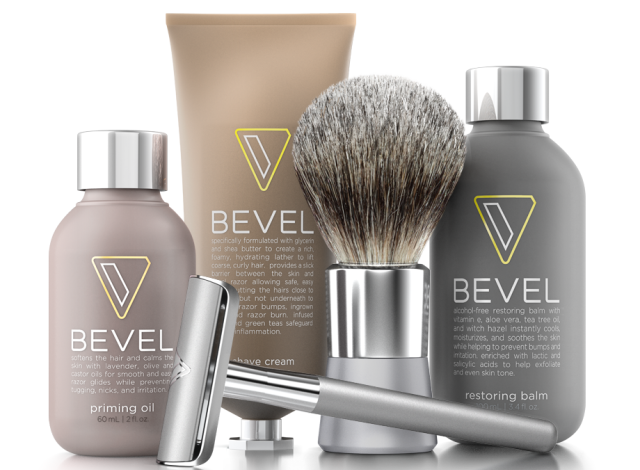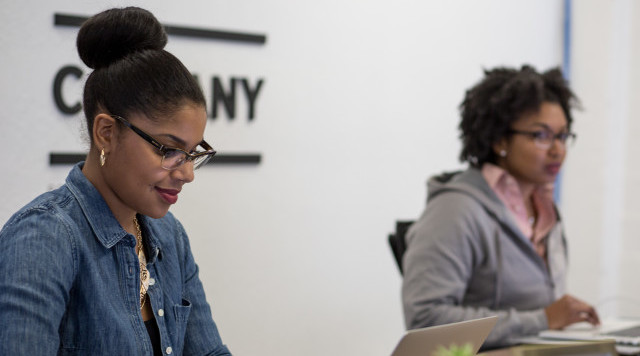
Savoy Winter 2015
Savoy Exclusive Interview:
The cover of Savoy Magazine’s Winter Issue 2015 features an in-depth and exclusive interview and profile of silicon valley rising star Tristan Walker, CEO of Walker & Company by Edward Cates.
Tristan Walker has purposefully built an atypical, successful Silicon Valley start-up with Walker and Company. Although unique in scope, Walker’s Palo Alto based personal care company has accrued the hallmark regalia of start-ups in the region. Impressive rounds of investment, a concentrated, highly talented tech savvy team and a charismatic visionary leader at the helm.
A reflection of their founder, Walker and Company is an authentic hybrid of tech, culture and purposeful genius. Walker employs a diverse team to develop and market personal care & beauty products that create solutions for African Americans and people of color. Walker’s flagship product Bevel is a single blade shaving system designed and clinically proven to reduce razor bumps for men and women with coarse and curly hair.
In September of 2015, Walker and Company secured a $24 million Series B round of investment and announced U.S. retail placement of Bevel shaving systems in select Target stores and online at Target.com. Participating investors in Walker and Company include an impressive list of supporters; Andreessen Horowitz, Upfront Ventures, Daher Capital, Collaborative Fund, Google Ventures, Felicis Ventures, and Melo7 Tech Partners (Carmello Anthony & Stuart Goldfarg). Walker has also attracted a star studded list of private investors including; Nas, Earvin “Magic” Johnson, John Legend, King Bach, Ron Johnson, San Francisco 49ers CEO Jed York, San Francisco 49ers President Paraag Marathe, Ryan Leslie, Andre Iguodala, Harrison Barnes, Anre and Paula Williams, Charles King and John Maeda. When asked how Walker attracts such an impressive list of private investors he responds humbly.
“They’ve walked down the same aisles I do. That’s it. That’s all I have to say. That’s all they have to experience,” Walker quickly responded. “No one gives me money just because I am who I am, that would be silly. They give us money because they believe that this is necessary. The reason they believe it is necessary, is because they are also a part of the 80% of Black males who get razor bumps. They’re also a part of the 100% of Black, Latino and Asian men that have to walk down those aisles. Walker and Company is a better way.”
 The Origin of Walker and Company
The Origin of Walker and Company
With a modest and challenged background, from Queens, NY, Walker was a superior student and athlete with the encouragement of his mother and brother (his father was killed when he was very young). His participation at the afterschool program at the Boys Club of New York led him to take the Secondary School Admission Test, interview and win a full scholarship to the prestigious Hotchkiss boarding school in Lakeville, CT. Walker credits his years at Hotchkiss as “four of the most transformative years of his life” as he was exposed to an elite curriculum and average class sizes of fourteen composed of young wealthy students including heirs to the Rockefeller and Ford legacies. Upon graduation from Hotchkiss, he pursued his undergraduate degree at Stony Brook University.
Admittedly, Walker was unaware of the dynamics and history of Silicon Valley prior to his arrival for graduate studies at the Stanford Graduate School of Business (2008-2012). While working on his MBA, he landed an internship with Twitter (2009), where he led a group that defined Twitter’s initial strategy towards the business market. He continued building relationships, maximizing opportunities and hustled his way into his first executive position for the then fledgling start-up Foursquare. Legend has it that following persistent outreach, Walker flew to New York, met with the founder of Foursquare and was offered a job contingent upon his ability to sign-up 30 retail business for their location registry in 30 days. Walker signed up 300 in a week and locked in his new role as their first Director of Business Development. In 2012 he left Foursquare. As many speculated what Walker would do next, he was named “Entrepreneur-in-residence” with Andreessen Horowitz, a $4 billion venture capital firm founded by Marc Andreessen and Ben Horowitz.
“When I was with Andreessen Horowitz as entrepreneur-in-residence, I had nine months to figure out what I wanted to do,” Walker reflects describing the formation of Walker and Company. “It took me several months to realize that I should only be working on things where I fundamentally felt like I was the best person in the world to solve those things. I wanted to build a bank, I wanted to fix trucking, I thought about ideas to optimize the care experience for elderly consumers. But, again, I wasn’t going to be the best person in the world to solve those problems. I felt that all the entrepreneurs that I was inspired by, had one quality about them that I resonated with, and it was their authenticity to the thing that they were building that makes them the best person in the world to build it. And then Ben Horowitz, would always encourage me by asking me one question, ‘Tristan, what do you believe that few people in Silicon Valley understand?”
Challenged with this approach, Walker developed an answer that spawned Walker and Company. “I have two things that I believe few people in Silicon Valley understand. The first, pertaining to this fundamental belief that global culture is often led by American culture, which is led by Black culture in the U.S., including influence in music, bands, fashion, food, etc. Secondly, I think the whole health and beauty product industry is doomed. For all types of business model and structural reasons. I know the experience finding the ethnic shelf in aisle 36 of a retailer, and having to pick up some product with incredibly outdated packaging stuck in the 70’s. That’s a problem. It’s disrespectful, particularly considering how culturally influential of a demographic group we are.”
Reengineering the Personal Care & Beauty Industry
Deep dive into the numbers of the personal care & beauty industry, and consumer loyalty trends of Black consumers and the viability of Walker and Company is clear. In 2013, Nielsen consumer reports forecasted the current buying power of African-American consumers to reach $1.3 trillion by 2017. Nielsen also reported that 43 million African-American consumers purchase nine times more ethnic beauty and grooming products than any other group. Black consumers support the brands, products, and services that run relevant advertising in the television shows and movies Blacks prefer. Blacks commit 18% of their annual retail dollars to store brands and continue to show resiliency in the Ethnic Hair and Beauty Aids. In 2014 Nielsen continued by listing African-Americans as more likely to shop for personal care and beauty aids online than the general market. 54% of the adult Black population is female, therefore, it’s not surprising that the top non-edible category of heavily purchased products by African Americans are Ethnic Hair and Beauty Aids, including grooming and razors.

Bevel Shaving System
Walker and Company ’s first product, Bevel, a single blade shaving system combines the product design and packaging detail you would expect from the likes of Apple. The premium design of the razor and quality of the botanical oils, creams and accessories create a luxury shaving experience. This is a stark contrast to the days of smelly depilatory creams and powder mixes often used as an alternative to multi-blade razors to prevent razor bumps. The GetBevel.com website is well designed and balances e-commerce functionality with information about shaving history and instructional videos.
Practicing What He Preaches
Walker is an active opinionated voice in the conversation about the lack of diversity in Silicon Valley. More importantly, he’s demonstrating how to build a diverse and inclusive, tech centered consumer products team with the build out and growth of Walker and Company in Palo Alto.
 “We’re a majority in women, we’re a majority in minority, and the diversity of our company reflects the diversity of America. It reflects the diversity of the world,” said Walker. “Diversity is our big competitive advantage, it’s number one, it keeps us honest and respectful. We all live those experiences of going to those retail shops and being disappointed. How do we build something that we can be proud of? We do that through our own authenticity.”
“We’re a majority in women, we’re a majority in minority, and the diversity of our company reflects the diversity of America. It reflects the diversity of the world,” said Walker. “Diversity is our big competitive advantage, it’s number one, it keeps us honest and respectful. We all live those experiences of going to those retail shops and being disappointed. How do we build something that we can be proud of? We do that through our own authenticity.”
While Google, Apple, Facebook and Yahoo ramp up corporate diversity inclusion, recruitment and retention outreach, Walker has built a company that boasts diversity as a competitive advantage.
“At the risk of sounding crass, it’s almost like I don’t have too much time to wait for the other companies to potentially hire great talented folks of color. As I run the business, I want to hire them. So, I can only be hopeful that they will continue to embrace it, and that it is not charity, that it actually has business value, because it does. As long as it has continued business value, we will continue to do it, and we will do it if the large companies do not, and we will do it if they do. We’re going to play our part as much as we can. Now, we’re not a thousand, ten-thousand-person company, but we do actually practice what we preach.”
Through his philanthropy Walker is working to improve the pipeline of Black and Latino’s employed in the tech industry. He co-founded (with Laura Weidman Powers) CODE2040 a nonprofit organization that creates pathways to educational, professional and entrepreneurial success in technology for underrepresented minorities with a specific focus on Blacks and Latinos.
“We started CODE2040 because when I got to Silicon Valley, at twenty-four that was the first time I heard about Silicon Valley. I wanted to ensure that folks, who were younger than I was at that time, didn’t make that same mistake. We saw the best way to do that was to bring the best performing, Black and Latino engineering undergraduates for placement at internships out here, and then provide them with all the tools they need to be incredibly successful. We send them to the Bloomberg’s Studios, where they do mock on air interviews with Emily Chang. They do fireside chats with Ben Horowitz and others, around their career and what that’s meant. They do technology and engineering workshops. That has led us to having a 90%+ full-time job offering in a world where, Silicon Valley and the aggregates still struggle to be more diverse.”
By Silicon Valley standards, Walker is a part of and connected to the inner circle of the most successful tech ventures in recent years. This unique cultivation and connectivity provides Walker a tremendous advantage as he focuses on innovating the personal care & beauty industry by creating respectful, helpful products for people of color. KBL Cosmetics is a private label manufacturing company for beauty brands.
“I’ve been a part of a lot of great companies with great products, but I can’t say I’m proud to support those companies the way my Mom supported brands like SoftSheen and Soul Train growing up. The way I think about Walker & Company, is believing we can actually build the first brand that this generation, future generations, would actually, fundamentally, be proud to support. How much is that company worth? That’s significant. That’s what I think about every single day. That will get us to the point where we can build something with as much legacy as a Proctor & Gamble after 175 years, or as much legacy as a Johnson & Johnson after 125 years, or as much legacy as Unilever, which is 60-70 years. Why can’t we do the same? I believe with every ounce of conviction that is why we are here, and we are going to do whatever we can to make that a reality.”
Edward Cates is a senior contributor to Savoy as a writer, marketer and entrepreneur based in Atlanta, GA. Follow Edward Cates on Twitter and Instagram @edwardcates.


